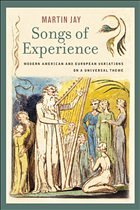"Martin Jay is one of the most influential intellectual historians in contemporary America, and here he shows once again a willingness to tackle the 'big issues' in the Western cultural tradition. . . . A remarkable history of ideas about the nature of human experience."--Lloyd Kramer, author of Threshold of a New World
"A magisterial study of one of the most elusive, contested, and pervasively important concepts of the Western philosophical tradition. Ranging from epistemology and aesthetics to the philosophy of history, religion, and politics, Songs of Experience brilliantly traces the major lines of theory and debate. Insightful, rich, and masterfully narrated, Jay's book sings with that well-tempered voice of erudition, synthetic intelligence, and generous grace that has become his enviable trademark."--Richard Shusterman, author of Pragmatist Aesthetics
Description
Few words in both everyday parlance and theoretical discourse have been as rhapsodically defended or as fervently resisted as "experience." Yet, to date, there have been no comprehensive studies of how the concept of experience has evolved over time and why so many thinkers in so many different traditions have been compelled to understand it. Songs of Experience is a remarkable history of Western ideas about the nature of human experience written by one of our best-known intellectual historians. With its sweeping historical reach and lucid comparative analysis--qualities that have made Martin Jay's previous books so distinctive and so successful--Songs of Experience explores Western discourse from the sixteenth century to the present, asking why the concept of experience has been such a magnet for controversy. Resisting any single overarching narrative, Jay discovers themes and patterns that transcend individuals and particular schools of thought and illuminate the entire spectrum of intellectual history.
As he explores the manifold contexts for understanding experience--epistemological, religious, aesthetic, political, and historical--Jay engages an exceptionally broad range of European and American traditions and thinkers from the American pragmatists and British Marxist humanists to the Frankfurt School and the French poststructuralists, and he delves into the thought of individual philosophers as well, including Montaigne, Bacon, Locke, Hume and Kant, Oakeshott, Collingwood, and Ankersmit. Provocative, engaging, erudite, this key work will be an essential source for anyone who joins the ongoing debate about the material, linguistic, cultural, and theoretical meaning of "experience" in modern cultures.
Contents
Introduction
1. The Trial of "Experience": From the Greeks to Montaigne and Bacon
2. Experience and Epistemology: The Contest between Empiricism and Idealism
3. The Consolations of Religious Experience: Schleiermacher, James, Otto and Buber
4. Returning to the Body through Aesthetic Experience: From Kant to Dewey
5. Politics and Experience: Burke, Oakeshott and the English Marxists
6. History and Experience: Dilthey, Collingwood, Scott and Ankersmit
7. The Cult of Experience in American Pragmatism: James, Dewey and Rorty
8. Lamenting the Crisis of Experience: Benjamin and Adorno
9. The Poststructuralist Reconstitution of Experience: Bataille, Barthes and Foucault
Conclusion
"A magisterial study of one of the most elusive, contested, and pervasively important concepts of the Western philosophical tradition. Ranging from epistemology and aesthetics to the philosophy of history, religion, and politics, Songs of Experience brilliantly traces the major lines of theory and debate. Insightful, rich, and masterfully narrated, Jay's book sings with that well-tempered voice of erudition, synthetic intelligence, and generous grace that has become his enviable trademark."--Richard Shusterman, author of Pragmatist Aesthetics
Description
Few words in both everyday parlance and theoretical discourse have been as rhapsodically defended or as fervently resisted as "experience." Yet, to date, there have been no comprehensive studies of how the concept of experience has evolved over time and why so many thinkers in so many different traditions have been compelled to understand it. Songs of Experience is a remarkable history of Western ideas about the nature of human experience written by one of our best-known intellectual historians. With its sweeping historical reach and lucid comparative analysis--qualities that have made Martin Jay's previous books so distinctive and so successful--Songs of Experience explores Western discourse from the sixteenth century to the present, asking why the concept of experience has been such a magnet for controversy. Resisting any single overarching narrative, Jay discovers themes and patterns that transcend individuals and particular schools of thought and illuminate the entire spectrum of intellectual history.
As he explores the manifold contexts for understanding experience--epistemological, religious, aesthetic, political, and historical--Jay engages an exceptionally broad range of European and American traditions and thinkers from the American pragmatists and British Marxist humanists to the Frankfurt School and the French poststructuralists, and he delves into the thought of individual philosophers as well, including Montaigne, Bacon, Locke, Hume and Kant, Oakeshott, Collingwood, and Ankersmit. Provocative, engaging, erudite, this key work will be an essential source for anyone who joins the ongoing debate about the material, linguistic, cultural, and theoretical meaning of "experience" in modern cultures.
Contents
Introduction
1. The Trial of "Experience": From the Greeks to Montaigne and Bacon
2. Experience and Epistemology: The Contest between Empiricism and Idealism
3. The Consolations of Religious Experience: Schleiermacher, James, Otto and Buber
4. Returning to the Body through Aesthetic Experience: From Kant to Dewey
5. Politics and Experience: Burke, Oakeshott and the English Marxists
6. History and Experience: Dilthey, Collingwood, Scott and Ankersmit
7. The Cult of Experience in American Pragmatism: James, Dewey and Rorty
8. Lamenting the Crisis of Experience: Benjamin and Adorno
9. The Poststructuralist Reconstitution of Experience: Bataille, Barthes and Foucault
Conclusion

